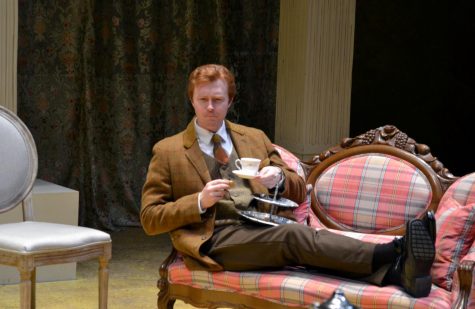‘Pygmalion’ great social commentary, mediocre love story

Bryan Vickery, who plays Henry Higgins, sips tea during a rehearsal for “Pygmalion” Saturday evening.
Once upon a time, I went to see a five-act play condensed into two, and so begins our story.
“Pygmalion” was craftily done. From costume, to set, to the slightest mannerisms of each character, there was a purpose to each and every aspect of the show.
I am always impressed by the ability people have to not only learn, but to perfect an accent and flourish. And as if that wasn’t enough, some characters, such as Eliza, drastically changed accents halfway through the play.
I had never seen “Pygmalion” before, so I had no prior knowledge of the unabridged version. However, as one might assume from taking five acts down to two, the show felt incomplete.
Now, let me preface with the statement that this is by no means a criticism of the actors and actresses, this is simply the writer in me disappointed by a plot narrative.
I felt there was this tremendous lead-up for there to be some sort of reconciliation between Eliza and Henry. I was getting a certain “Pride and Prejudice” feeling from the two of them. You know, the stuck up rich fellow who is brooding and misunderstood and all he really needed in life was love? And the whole “we can’t stand each other” shtick was really just a grandiose cover up for their undying love for each other.
Well, I’ve been wrong before.
Throughout the play, and definitely toward the end, there was tremendous tension between Eliza and Henry which was implicit of their secret love for each other, or so I thought. You see Eliza’s pain at being thrown out after Henry’s voice lessons are done, no doubt assuming he cared for her more than a student.
And then you watch Henry rely on her like a wife, telling her that he cared for her and missed her when she left. And then the play ends with Henry just as bad as he was in the beginning, and Eliza threatening to marry a man who she met and fell in love with just a few days prior.
There was no change or development in Henry and I was disappointed by that. It felt unfinished and rushed. Additionally, Eliza’s love story with Freddy felt tacked onto the end to explain why she would leave Henry so abruptly.
Now let me move away from the love story because this play wasn’t really about love anyway, was it? No, this play was making a point at societal expectations and divisions.
On that note, I was thoroughly impressed
The amount of undercurrent jabbing at societal issues was impressive. Not only were there jabs at men, but there were also jabs at uppity high-class people thinking they don’t need to be a good person and the notion that your place in society is determined by blood.
The entire premise of the show was making Eliza pass as a duchess when she was a low-class street seller, and no one was the wiser. They thought she was a princess.
And the whole thing is to make a fool of the pretentious snobs who think good manners and high-class attitudes are hereditary.
And then for Eliza to act of someone of a higher class than the crude and inept Henry was a tension of who really deserved high class at all.
Overall the play had a little good, a little bad and a little good again. And that my friends is what we call a compliment sandwich.
 (4 / 5)
(4 / 5)


